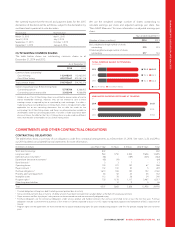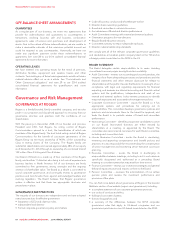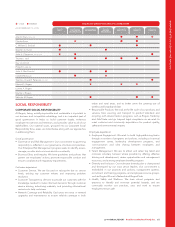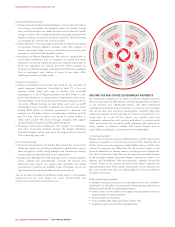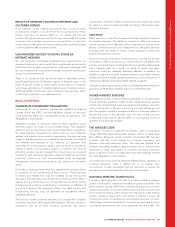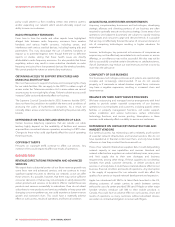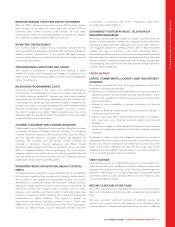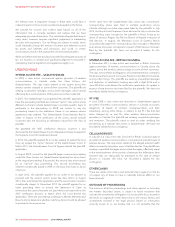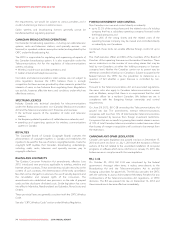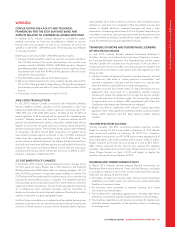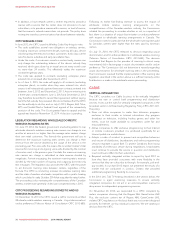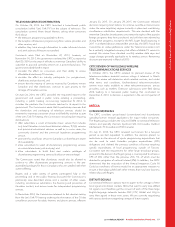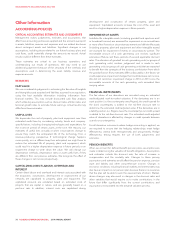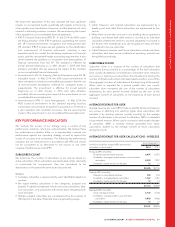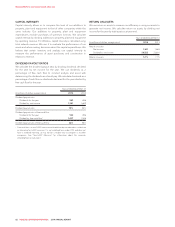Rogers 2014 Annual Report Download - page 76
Download and view the complete annual report
Please find page 76 of the 2014 Rogers annual report below. You can navigate through the pages in the report by either clicking on the pages listed below, or by using the keyword search tool below to find specific information within the annual report.MANAGEMENT’S DISCUSSION AND ANALYSIS
the relevant time. A legislative change in these rates could have a
material impact on the amounts recorded and payable in the future.
We provide for income and indirect taxes based on all of the
information that is currently available and believe that we have
adequately provided these items. The calculation of applicable taxes in
many cases, however, requires significant judgement in interpreting
tax rules and regulations. Our tax filings are subject to audits, which
could materially change the amount of current and deferred income
tax assets and liabilities and provisions, and could, in certain
circumstances, result in the assessment of interest and penalties.
While we believe we have paid and provided for adequate amounts of
tax, our business is complex and significant judgement is required in
interpreting how tax legislation and regulations apply to us.
LITIGATION RISKS
SYSTEM ACCESS FEE — SASKATCHEWAN
In 2004, a class action commenced against providers of wireless
communications in Canada under the Class Actions Act
(Saskatchewan). The class action related to the system access fee
wireless carriers charged to some of their customers. The plaintiffs are
seeking unspecified damages and punitive damages, which would
effectively be a reimbursement of all system access fees collected.
In 2007, the Saskatchewan Court granted the plaintiffs’ application to
have the proceeding certified as a national, “opt-in” class action where
affected customers outside Saskatchewan must take specific steps to
participate in the proceeding. In 2008, our motion to stay the
proceeding based on the arbitration clause in our wireless service
agreements was granted. The Saskatchewan Court directed that its
order, in respect of the certification of the action, would exclude
customers who are bound by an arbitration clause from the class of
plaintiffs.
We appealed the 2007 certification decision, however, it was
dismissed by the Saskatchewan Court of Appeal and leave to appeal to
the Supreme Court of Canada was denied.
In 2012, the plaintiffs applied for an order seeking to extend the time
they can appeal the “opt-in” decision of the Saskatchewan Court. In
March 2013, the Saskatchewan Court of Appeal denied the plaintiffs’
application.
In August 2009, counsel for the plaintiffs began a second proceeding
under the Class Actions Act (Saskatchewan) asserting the same claims
as the original proceeding. If successful, this second class action would
be an “opt-out” class proceeding. This second proceeding was
ordered conditionally stayed in 2009 on the basis that it was an abuse
of process.
In April 2013, the plaintiffs applied for an order to be allowed to
proceed with the second system access fee class action. In August
2013, the court denied this application and the second action remains
conditionally stayed. In December 2013 the plaintiff applied for an
order permitting them to amend the Statement of Claim to
reintroduce the claims they were not permitted to proceed with in the
2007 certification decision. In March 2014, the court denied this
application. There are proceedings underway in Alberta, Manitoba and
Nova Scotia to determine whether matching claims should be allowed
to proceed in those provinces.
At the same time the Saskatchewan class action was commenced,
corresponding claims were filed in multiple jurisdictions across
Canada, although no active steps were taken by the plaintiffs. In July
2014, the Nova Scotia Supreme Court declined to stay or dismiss the
corresponding claim brought by the plaintiffs in Nova Scotia as an
abuse of process. Rogers has filed its Notice of Appeal in respect of
that decision. In August, the Manitoba Court of Queen’s Bench
unconditionally stayed the corresponding claim brought in Manitoba
as an abuse of process. An appeal in respect of that decision has been
filed by the plaintiffs. We have not recorded a liability for this
contingency.
SYSTEM ACCESS FEE – BRITISH COLUMBIA
In December 2011, a class action was launched in British Columbia
against providers of wireless communications in Canada about the
system access fee wireless carrierschargetosomeoftheircustomers.
The class action relates to allegations of misrepresentations contrary to
the Business Practices and Consumer Protection Act (British Columbia),
among other things. The plaintiffs are seeking unspecified damages
and restitution. A certification hearing was held in April 2014 and in
June 2014 the court denied the certification application. An appeal in
respect of that decision has been filed by the plaintiffs. We have not
recorded a liability for this contingency.
911 FEE
In June 2008, a class action was launched in Saskatchewan against
providers of wireless communications services in Canada. It involves
allegations of breach of contract, misrepresentation and false
advertising, among other things,inrelationtothe911feethathad
been charged by us and the other wireless telecommunication
providers in Canada. The plaintiffs are seeking unspecified damages
and restitution. The plaintiffs intend to seek an order certifying the
proceeding as a national class action in Saskatchewan. We have not
recorded a liability for this contingency.
CELLULAR DEVICES
In July 2013, a class action was launched in British Columbia against
providers of wireless communications in Canada and manufacturers of
wireless devices. The class action relates to the alleged adverse health
effects incurred by long-term users of cellular devices. The plaintiffs are
seeking unspecified damages and punitive damages, effectively equal
to the reimbursement of the portion of revenues the defendants have
received that can reasonably be attributed to the sale of cellular
phones in Canada. We have not recorded a liability for this
contingency.
OTHER CLAIMS
There are certain other claims and potential claims against us. We do
not expect any of these to have a materially adverse effect on our
financial results.
OUTCOME OF PROCEEDINGS
The outcome of all the proceedings and claims against us, including
the matters described above, is subject to future resolution that
includes the uncertainties of litigation. It is not possible for us to predict
the result or magnitude of the claims due to the various factors and
uncertainties involved in the legal process. Based on information
currently known to us, we believe that it is not probable that the
72 ROGERS COMMUNICATIONS INC. 2014 ANNUAL REPORT



